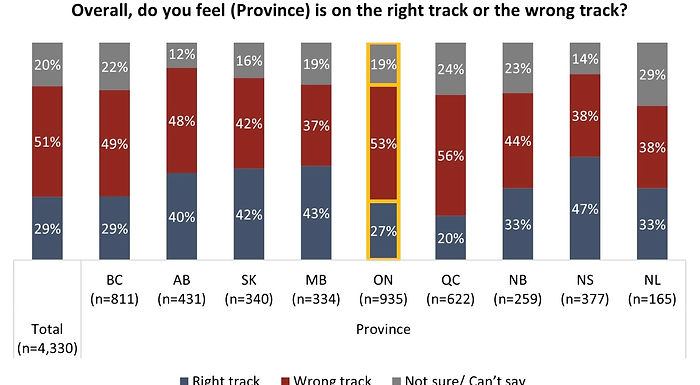Angus Reid survey finds most provinces facing public dissatisfaction
Cheryl Bowman, The Rural Alberta Report
September 14, 2025

Canadian Politcs
Alberta residents give relatively favourable marks to their provincial government compared with other provinces, but most remain critical of its performance on key issues, according to recent findings from an Angus Reid Institute poll. The Cross-Canada Outlook, conducted from August 28 to September 5, 2025, surveyed just over 4,000 Canadian adults across all provinces.
Using a weighted provincial government performance index that accounts for which issues matter most to people and how well governments are rated on those, the United Conservative Party government under Premier Danielle Smith ranks highest among provincial governments in Canada. Despite that lead, Albertans express concern about direction and overall performance.
The issues Albertans identify as most critical include cost of living, health care, the economy, public safety, and housing affordability. On each, a majority see the government’s efforts as lacking. For instance, more than two-thirds rate performance on rising costs and health care as poor. Premier Smith’s personal approval rating is modestly negative: slightly more disapprove than approve of her leadership, though she remains one of the more polarizing provincial leaders. When asked whether Alberta is “on the right track” or “on the wrong track,” 48 percent say the wrong direction, 40 percent say the right path.
Comparisons from other provinces show both contrasts and similarities in what people are prioritizing, and how they judge their leadership.
In Quebec, Premier François Legault is far less popular than most of his counterparts. Only around one-in-five approve of his performance, while more than seventy per cent disapprove. Concern over issues like cost overruns in public projects and perceptions of weak transparency contribute to low ratings.
In British Columbia, David Eby has seen a steady slide in public approval, now at about 41 percent, the lowest since he became premier. Key challenges include fiscal pressures, disputes over labour (such as strikes), and criticisms over policy and court decisions involving Indigenous land rights.
In Manitoba, Premier Wab Kinew remains among the best-rated leaders in the country, though his approval has dropped from previous high points. Approximately 61 percent approve, down from earlier quarters. Strong approval remains among those who “strongly” approve, though that has slipped.
In Saskatchewan, Scott Moe holds steady public support. About half the population there approve of his performance, and the figure has remained relatively stable over time. Key regional issues include trade disruptions (such as tariffs on canola) and response to climate or weather events.
In Ontario, Premier Doug Ford is nearer the lower end of the rankings. Approval is in the low 40-percent range, with many people critical of how economic pressures, jobs, and trade-related issues are being handled.
In the Atlantic provinces, leaders vary, but some have higher net approval. In Newfoundland and Labrador, Premier John Hogan is newer to office and has approval at about 51 percent, with a smaller share disapproving. In Nova Scotia and New Brunswick, Premiers Tim Houston and Susan Holt maintain relatively positive ratings (just over 50 percent) though both face criticisms over budget management, promises around environmental regulations, or delays on key campaign pledges.
Across the country, cost of living, affordability of housing, and health care stand out as shared concerns. Many provincial governments are judged more harshly than favourably on those topics. While some premiers enjoy relatively strong public support, others are seeing declines or stagnant ratings. Compared to most provinces, Alberta’s government scores better in the weighted performance index, but its citizens echo many of the same frustrations seen elsewhere: struggles with affordability, dissatisfaction with health care, and worry about safety and direction.









